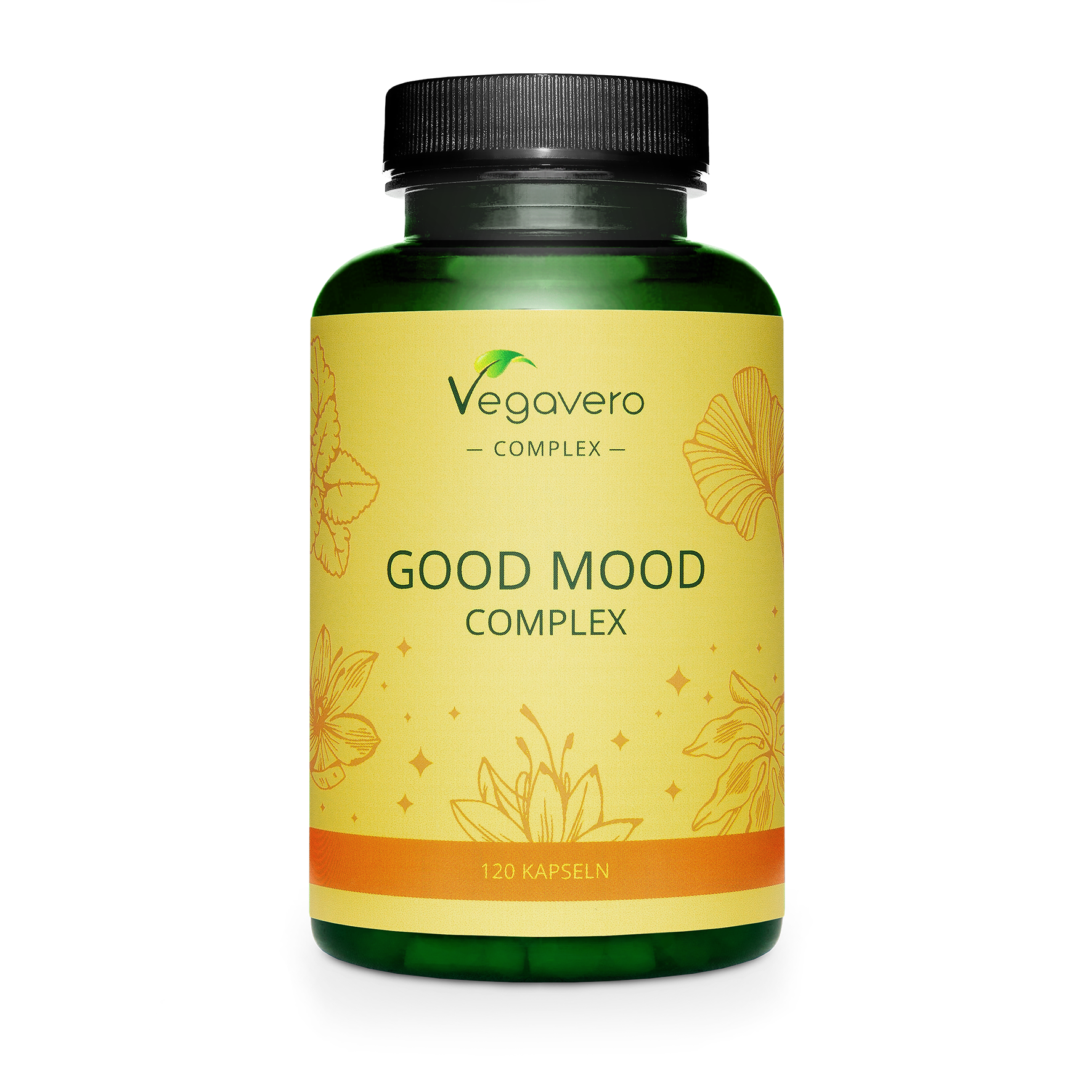
November blues, winter depression... When the days become shorter, colder and uncomfortable, many of us have to deal with seasonal depression. In a survey on mood changes in winter, 24% of men and 36% of women said that they fell into a low mood in winter. [1] The main cause is the lack of light in autumn and the winter months: The short days signal a change in the day-night rhythm to the body leading to an imbalance of hormones and neurotransmitters in the brain. This can trigger severe mood swings. The consequences are often listlessness, depression, an extreme need for sleep and a craving for sweets. [2]
But not with us! We don't let the approaching winter spoil our mood, so we have put together a few tips that will keep us smiling even on those short, gloomy days.
Tip 1: Treat yourself - Good Mood Food
Proper nutrition is essential for our well-being. Foods rich in tryptophan, such as bananas, dates or figs, can additionally boost our good mood, as L-tryptophan is a precursor of the "happiness hormone" serotonin. Serotonin functions as a messenger substance in the brain, which transmits information between nerve cells and influences feelings such as balance, well-being, and satisfaction. [3] Foods that contain gamma-aminobutyric acid (GABA) including wholegrain products, broccoli or walnuts can also help. GABA also induces a calming effect, as it inhibits the excitation of nerve cells in the brain, and so helps to relax them. [4] Of course, "Soul food" like hearty stews and hot soups can also be a real treat on cold days. And if we are honest: Chocolate also makes you happy, and freshly baked biscuits create a homely feeling and anticipation of Christmas, especially during the Advent season.
Tip 2: More sun, please!
If a lack of sunlight can lead to seasonal depression, it only sounds logical to counteract with sunlight. In direct sunlight, the body can produce vitamin D through the skin itself - which of course subsides as soon as we adapt to the cold by wrapping ourselves up with those cozy winter sweaters and the sky is covered with grey clouds. Sufficient vitamin D reduces the risk of suffering from depression and mood swings and supports a positive mood. [5] According to one study, 60% of patients experience an improvement in their condition after one week of daily treatment with light therapy (30 to 40 minutes exposure to a strong light source). Light therapy can also be used prophylactically at the beginning of autumn. [6]
Tip 3: Sport makes you happy...
...Really! Being active distracts us from negative feelings and perceptions, reduces anger and aggression and shows us that we can master all situations. In addition, the concentration of messenger substances in the brain changes and a lot of hormones are produced - the cortisol level rises, noradrenaline and adrenaline are released. These three hormones are usually associated with stress, as they provide our body with quickly available energy in dangerous or stressful situations. On the other hand, due to their activating effect, they ensure that we are focused and alert. The WHO recommends spending 150 minutes a week with moderate endurance training - that is, "running without panting". [7] Exercise in the fresh air is especially good for many people.
Tip 4: Maintaining social contacts is balm for the soul
But how? At the moment, this is a little more difficult than usual due to the corona pandemic. Luckily, there are so many ways to stay in touch with loved ones - the full potential of social media is especially apparent in times like these. Even a phone call with your grandmother, a letter to your best friend or a text message to your relatives will do the trick. It is about showing that you think about each other and feeling that you are not alone. And that is always a good idea, regardless of the season.
Tip 5: Laugh happily with Laughter Yoga
Have you ever heard of laughter yoga (Hasyayoga)? Laughter Yoga focuses on getting people to laugh for no reason, combined with simple yoga breathing techniques. From an unfounded and "artificial" laughter we then turn into a real one. So basically "Fake it, until you make it" - why not give it a try? Otherwise, a really funny film, a series or an audio book, which will make you laugh your heart out, can also obviously lift the mood considerably.
Tip 6: Traditional medicinal plants to fight low mood
Herbal remedies have been used for centuries to treat mood swings and depression. Well-known representatives are for example St. John's wort, saffron, hops, passionflower or lemon balm. [8] They can be used to make teas, they are found in bath additives that have relaxing effects, and some are also popular as essential oils in aromatherapy, which is known to be a gentle treatment for mood swings.
There are many ways to arm yourself against the approaching "dark season": a targeted choice of food, as much sunlight as possible, exercise and time with loved ones, a lot of laughing and asking grandma for tried and tested household remedies such as tea made from medicinal plants.
Another option is to take food supplements containing medicinal plants or other useful active substances in appropriate doses. We have several products to choose from: Our vitamin D3 + K2 spray can contribute to normal vitamin D3 levels if the body's own synthesis is restricted by a lack of light in winter. Our saffron and organic St. John's wort with passionflower is a plant-based and natural alternative to positively influence the mood. Our L-tryptophan and L-tryptophan Plus also have a balancing and calming effect. Our Good Mood Complex with various plant extracts such as ginkgo biloba, passionflower, lemon balm, saffron, bacopa monnieri and vitamin C from acerola ensures a good mood as well.
Winter can come!
Sources
[1] forsa, „Inwiefern ändert sich im Winter Ihre Stimmung?,“ Statista Research Department, 7 10 2009. [Online]. Available: https://de.statista.com/statistik/daten/studie/38402/umfrage/stimmung-im-winter/#professional. [Access on 18.11.2020]
[2] Kurlansik SL, Ibay AD. Seasonal affective disorder. Am Fam Physician. 2012 Dec 1;86(11):1037-41. PMID: 23198671.
[3] Kulikov AV, Popova NK. Tryptophan hydroxylase 2 in seasonal affective disorder: underestimated perspectives? Rev Neurosci. 2015;26(6):679-90. doi: 10.1515/revneuro-2015-0013. PMID: 26167977.
[4] Taylor M, Bhagwagar Z, Cowen PJ, Sharp T. GABA and mood disorders. Psychol Med. 2003 Apr;33(3):387-93. doi: 10.1017/s0033291702006876. PMID: 12701660.
[5] Casseb GAS, Kaster MP, Rodrigues ALS. Potential Role of Vitamin D for the Management of Depression and Anxiety. CNS Drugs. 2019 Jul;33(7):619-637. doi: 10.1007/s40263-019-00640-4. PMID: 31093951.
[6] Isaacs G, Stainer DS, Sensky TE, Moor S, Thompson C. Phototherapy and its mechanisms of action in seasonal affective disorder. J Affect Disord. 1988 Jan-Feb;14(1):13-9. doi: 10.1016/0165-0327(88)90066-3. PMID: 2963047.
[7] World Health Organization. Global recommendations on physical activity for health. 2010 Nov. ISBN: 9789241599979.
[8] Sarris J, Panossian A, Schweitzer I, Stough C, Scholey A. Herbal medicine for depression, anxiety and insomnia: a review of psychopharmacology and clinical evidence. Eur Neuropsychopharmacol. 2011 Dec;21(12):841-60. doi: 10.1016/j.euroneuro.2011.04.002. Epub 2011 May 23. PMID: 21601431.
Recommended Product

GOOD MOOD COMPLEX
A unique blend of natures best 'mood boosters'- 100% vegan, lab-tested, and free from additives.


